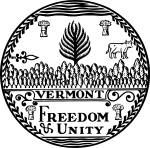
The 2006 United States Senate election in Vermont was held November 7, 2006. Incumbent independent Senator Jim Jeffords decided to retire rather than seek reelection to a fourth term, and Bernie Sanders was elected to succeed him.
The 1836–37 United States House of Representatives elections were held at various dates in different states from July 1836 to November 1837.

The 1834–35 United States House of Representatives elections were held during President Andrew Jackson's second term.
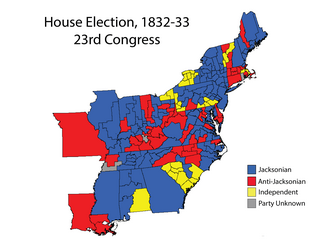
The 1832–33 United States House of Representatives elections were held concurrently with the 1832 presidential election, in which Democrat Andrew Jackson was re-elected.

In the 1830–31 United States House of Representatives elections, the supporters of President Andrew Jackson lost ten seats during his first term, but managed to maintain control of the chamber amidst the growth of two new opposition movements.

In the 1828–29 United States House of Representatives elections, while Jacksonians soundly took control of the presidency, with Andrew Jackson's victory, they greatly increased their majority in Congress. Outgoing President John Quincy Adams's unpopularity played a major role in the Jacksonian pick-up, as did the perception of the Anti-Jacksonian Party as urban and elitist. Major increases in suffrage also heightened Jacksonian wins, as newly enfranchised voters tended to associate with Jacksonian principles. The Anti-Masonic Party, a single issue faction based on distrust of Freemasonry, became the first third party in American history to garner seats in the House.
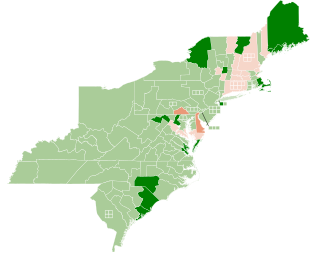
The 1804–05 United States House of Representatives elections were held at various dates in each state between April 24, 1804 and August 5, 1805. The Congress first met on December 2, 1805. The elections occurred at the same time as President Thomas Jefferson's re-election.
The 1802–03 United States House of Representatives elections were held at various dates in each state, from April 26, 1802 to December 14, 1803 during President Thomas Jefferson's first term in office. It was common in the early years of the United Congress for some states to elect representatives to a Congress after it had already convened. In the case of the 8th Congress, the representatives from New Jersey were only elected after its first meeting on October 17, 1803.
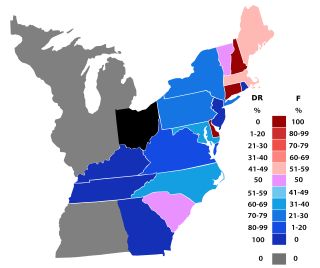
The 1800–01 United States House of Representatives elections were held at the same time as the 1800 presidential election, in which Vice President Thomas Jefferson, a Democratic Republican, defeated incumbent President John Adams, a Federalist.
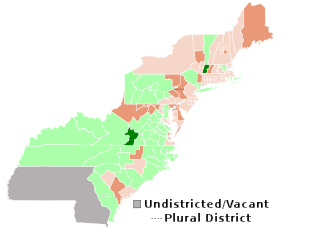
The 1796–97 United States House of Representatives elections took place in the various states took place between August 12, 1796, and October 15, 1797. The first session was convened on May 15, 1797, at the proclamation of the new President of the United States, John Adams. Since Kentucky and Tennessee had not yet voted, they were unrepresented until the second session.

The 2010 Vermont gubernatorial general election took place on November 2. Vermont and New Hampshire are the only two states where the governor serves a two-year term instead of four. Primary elections took place on August 24.

The electoral history of Bernie Sanders includes the 2016 and 2020 Democratic Party presidential primaries and caucuses, and elections as United States Senator from Vermont, United States Representative from Vermont's at-large district (1991–2007), and Mayor of Burlington (1981–1989). Sanders contested 23 elections, of which he won 17. He has won every election he has contested since his first election to the House of Representatives in 1990, except his presidential runs.

Peter Isaac Diamondstone was an American lawyer and socialist politician from the state of Vermont, best known as a perennial candidate and co-founder of the Liberty Union Party. He ran for various Vermont political offices, always unsuccessfully, in every election cycle from 1970 until 2016.

The 2020 Vermont gubernatorial election was held on November 3, 2020, to elect the Governor of Vermont. As Vermont does not impose term limits upon its governors, incumbent Republican Governor Phil Scott was eligible to run for reelection to a third two-year term in office. On November 18, 2019, he confirmed that he was running for reelection, but did not yet publicly announce his campaign. On May 28, 2020, he officially announced his candidacy but stated that he would not campaign, maintain a campaign staff, or fundraise because of the state of emergency due to the COVID-19 pandemic in Vermont. The primary was held on August 11. Scott won re-election to a third term in a landslide, defeating Progressive and Democratic nominee, Lieutenant Governor David Zuckerman.

Maine elected its members September 8, 1828. Maine required a majority vote for election, so the 5th district district election was settled on the second ballot on December 22, 1828, and the 6th district district election was settled on the sixth ballot on April 5, 1830, near the end of the next Congress.

The 1827 Vermont gubernatorial election took place in September and October, and resulted in the election of Ezra Butler to a one-year term as governor.

The 1828 Vermont gubernatorial election took place in September and October, and resulted in the election of Samuel C. Crafts to a one-year term as governor.

The 1830 Vermont gubernatorial election took place in September and October, and resulted in the election of Samuel C. Crafts to a one-year term as governor.

The 1832 Vermont gubernatorial election took place in September and October, and resulted in the election of William A. Palmer to a one-year term as governor.
